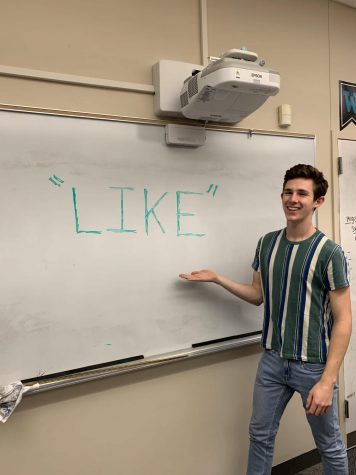The Likes of the Teens
November 25, 2019
Do you ever like notice how like people say “like” a bunch of times in the same like sentence? Teens across America are notoriously famous for overusing filler words in their everyday speech as well as in more formal environments.
In the English language, a filler word is a sound or word that is used in conversation as a tactic to pause and gain a moment to think about what to say. Common filler words teens and adults alike often utilize are “um”, “err”, “uhh”, and of course “like”. According to the New York Times writer, Shannon Doyne, we say “like” as well as other filler words to “implicitly recognizes that our news may be unwelcome to the hearer, and to soften the blow by offering one’s suggestion discreetly swathed in a garb of hypothetical-ness.”
 Upper-Class teenage girls that lived in California during the 1980s and 1990s, better known as “Valley Girls,” started the trend of overusing filler words in everyday conversations such as “like.” Valley Girls were idolized and envied by many at that time, which led to a large number of their peers overusing filler words in an attempt to emulate the Valley Girls.
Upper-Class teenage girls that lived in California during the 1980s and 1990s, better known as “Valley Girls,” started the trend of overusing filler words in everyday conversations such as “like.” Valley Girls were idolized and envied by many at that time, which led to a large number of their peers overusing filler words in an attempt to emulate the Valley Girls.
Throughout high schools in America, students have continued the trend of using the word “like” improperly in sentences as well as other filler words to bridge awkward breaks in their speech. Using “like” has become a norm in the language of students, and while it can be effective in comparisons, overuse of “like” can quickly become very annoying and counterproductive. Fellow Ipswich High School student Ethan Driscoll stated, “Two or more ‘likes’ in a sentence would be considered excessive. It’s not a big deal if it is not excessively overused.”
The staff at Ipswich High School has always taken note of this trend in the spoken language among the students and their co-workers. Teachers can agree that the improper use of the word “like” in a formal setting conveys the impression that, “They [students] are unprepared or uneducated, or not motivated to do well,” stated English teacher, Mrs. Slawson. Mrs. Slawson has also observed that “Our generation has developed more fillers for writing instead of older generations that use them more in the spoken language”
The first step to stopping this unprofessional language is to be aware that you are doing it. Mrs. Slawson recommends “A pause is better than a filler word. Filming yourself practicing the speech, so that you can be aware of your use of filler words can really help. Also, having an effective tool in front of you, such as a notecard that outlines the major points of your speech, can be extremely effective. Lastly, practice, practice, practice.”
Alongside Mrs. Slawson’s recommendation, Ethan Driscoll recommends, “[It helps] if you can think of what you are going to say ahead of time, as well as try to take notice when you are doing it [saying “like”] a lot.” Taking the time to think about what you are saying, and being more cognizant of a tendency to use filler language such as “like” can be very helpful in correcting this annoying but common habit. The good news is that, with practice, you can overcome filler language. Now, go practice!
